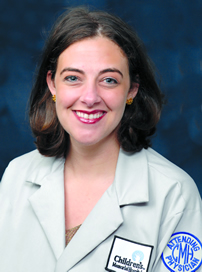
Megan Curran, MD, Assistant Professor of Pediatrics at Northwestern University Feinberg School of Medicine, received the Clinician Scholar Educator (CSE) Award from the Rheumatology Research Foundation in 2012. The CSE Award supports educators dedicated to developing new and improved programs to enhance education in musculoskeletal and rheumatic diseases for future doctors and rheumatology health professionals. Dr. Curran used the award to implement an online resource for pediatric residency programs to access and share educational materials focused on rheumatic disease.
Dr. Curran will speak about her project during Innovative Educators, Novel Techniques: A Rheumatology Research Foundation Special Session, 2:30 – 4:00 pm Tuesday. The session features research conducted by CSE Award recipients.
Q: Tell us a little bit about your career path and why you pursued pediatric rheumatology.
A: I always knew I was interested in pediatrics and pursuing a subspecialty, but — similar to approximately 30 percent of medical students — I didn’t have exposure to a pediatric rheumatologist in my education.
I had a chance to do an away rotation at a large children’s hospital where there was a pediatric rheumatologist, and that kind of got me hooked on rheumatology. It encouraged me and fueled my scholarly work. There are only about 300 of us [pediatric rheumatologists] and many trainees don’t get a chance to meet us and consequently our diseases — RA, lupus, vasculitis. They’re relatively rare diseases and aren’t typical for medical students, so often times they’re not diagnosed quickly.
Q: How did you first hear about the Foundation’s grant opportunities?
A: For my research, I wanted to focus on education. During fellowship, I worked on a project to identify important topics in rheumatology we’d like every pediatrics resident to learn about, regardless of how much exposure they had to rheumatology. That led to a mentorship relationship that drove my career in medical education research. Through that work, I earned the Clinician Scholar Educator Award.
Q: Tell us about your project.
A: Pediatric rheumatologists are often asked to give lectures or lead workshops, and those take a substantial amount of preparation. With funding initially received through the Department of Pediatrics, we developed a website intended for pediatric rheumatologists to exchange materials they create.
With the website developed for pediatric rheumatologists, I applied for the Clinician Scholar Educator Award with the idea of developing a similar tool for chief residents around the country, particularly for those at programs without pediatric rheumatologists. The goal was to build this learning platform, study how it is used, and develop it into a known resource for residency programs seeking to increase their teachings of rheumatic disease.
So far, those program directors have been very receptive to me inviting their chiefs to join the site, but of course, chiefs are incredibly busy. I’m looking forward to sharing some lessons learned at Annual Meeting in San Francisco. Hopefully, I can open the site further and build sustained, long-term relationships with residency programs to ensure they have what they need to teach their residents and students about rheumatology.
Q: What did receiving a grant mean to you and your career?
A: There really aren’t a lot of awards that support educational research. The National Institutes of Health (NIH) supports a lot of basic and clinical research, which is so important, but medical education grants are hard to come by. I think it’s amazing how supportive the Foundation is.
Through becoming a Clinician Scholar Educator awardee, I’ve been able to join the community of other awardees who meet at Annual Meeting. It’s a terrific group of educators and mentors, which is so meaningful to anyone working toward an academic career.
I know that one of the underlying goals of the ACR and the Foundation is to publicize the field of rheumatology and invite more trainees into the field. However, increasing awareness among trainees as to the value of the Foundation is also really important. As the Foundation works to support academic rheumatologists, more and more trainees will have opportunities to experience rheumatology.
Q: Why is it important for ACR/ARHP members to support the Foundation?
A: There are so few funding sources for people doing educational research. I think it’s so important to support rheumatology. Giving even just a little bit will help ensure the time and support needed for educational and research projects.


